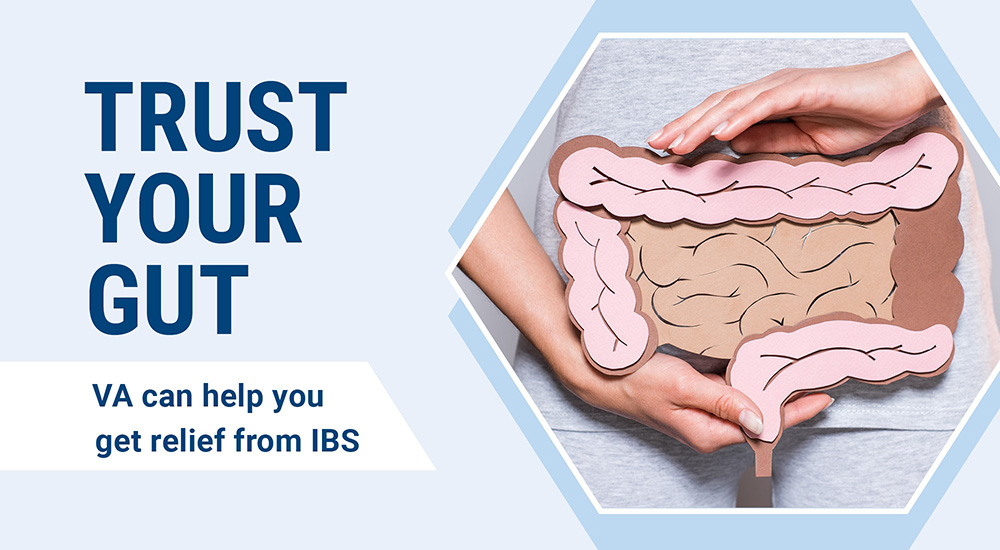“Trust your gut” may sound like wishful thinking if you live with symptoms of irritable bowel syndrome (IBS), an ongoing health condition that causes pain, constipation, diarrhea and/or gas. But your VA primary care provider can work with you to create a plan to relieve your symptoms and help you trust your gut again.
If you’re dealing with IBS symptoms, you’re not alone. IBS affects about one-third of women Veterans.
What is IBS?
IBS is a disorder of the brain-gut interaction. It’s a complex medical condition that involves both your physical health and mental health.
Physical symptoms of IBS can vary in severity and may include abdominal pain, cramping or bloating that is related to passing a bowel movement, or changes in appearance of bowel movement, or changes in how often you are having a bowel movement.
The exact cause of IBS is unknown. Digestion abnormalities, nerve hypersensitivity, the immune system and your genetics may all be potential causes. Since IBS is a disorder of the brain-gut interaction, it’s often associated with mental health conditions, especially depression and/or anxiety.
Additionally, women Veterans who have experienced trauma and/or violence, including posttraumatic stress disorder (PTSD), and sexual trauma, may be at a higher risk for IBS. Many people who have IBS experience difficulties carrying out their normal activities, which often lowers their quality of life and can lead to feelings of isolation.
Treatment plans designed for you
The best treatment plans for IBS are those that target both your physical health and your mental health. IBS can be different for each person—some may have more problems with constipation while others may have diarrhea—and require distinct types of treatment. Your VA primary care provider will work with you to develop a plan tailored to your needs.
VA offers services and treatment options such as:
- Dietary counseling and interventions
- Medications
- Yoga and meditation
- Help incorporating regular exercise into your routine
VA also offers effective mental health focused treatments for your IBS, such as IBS-specific cognitive behavioral therapy, gut-directed hypnotherapy and mindfulness-based therapy. These are generally used in combination with other treatments like medications.
If your treatment plan isn’t working, don’t lose hope. Your provider can work with you to adjust or tweak your plan as needed. It may take a few tries to find the best plan for you.
What can I do now?
There also are a few things you can try at home to get relief from your symptoms.
- Exercise. Regular, mild physical exercise has been proven to increase gas clearance, reduce bloating and relieve constipation.
- Try yoga. Yoga is a mind and body exercise that can help soothe the mental stress associated with IBS, as well as provide the benefits of physical exercise.
- Change your diet. Try a diet like the low FODMaP diet. About 75% of people with IBS who tried a low FODMaP diet experienced relief from their IBS symptoms.
Connect with VA health care
If you have questions about VA health care services, or if you do not know where to start, then call, text or chat online with our Women Veterans Call Center at 855-829-6636. Your call will be answered by women representatives who are specifically trained to:
- Help you set up an appointment in your area
- Answer your questions about benefits and eligibility
- Help you find out what resources or services are available at your VA
If you do not already use VA health care, you can also use the following online tools:
- Find out if you are eligible for VA health care
- Enroll in VA health care if you have not already
- Find your local VA to learn what services may be available and to make an appointment.
Topics in this story
More Stories
The Dayton VA Medical Center released its March 2025 Good News Report, spotlighting compassionate care, special recognitions, and life moments shared by Veterans and staff.
Each year, I return to honor my old corpsman's memory and reflect on serving together.
Veteran was trained to collaborate with fellow Airmen. Having his buddy’s six was important, and still is.







What are the symptoms how can I find out
I presented my symptoms. Three months later I had an appointment to see my primary. She ordered a colonoscopy. That department wanted me to justify my primary ‘s referral. Needless to say, I am 68 and have never had a colonoscopy.
Very informative